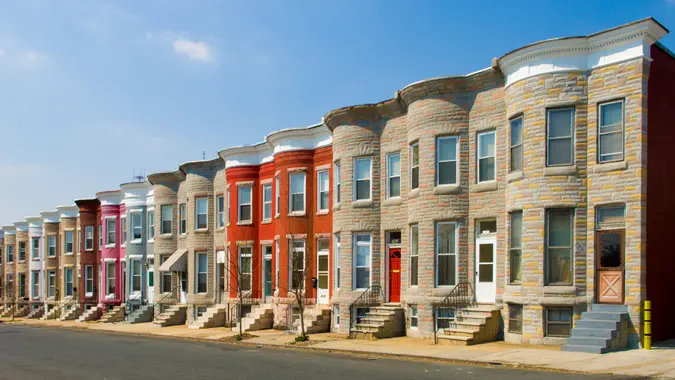Housing Expert Explains Why 2025 Is Becoming a Buyer’s Market

Commitment to Our Readers
GOBankingRates' editorial team is committed to bringing you unbiased reviews and information. We use data-driven methodologies to evaluate financial products and services - our reviews and ratings are not influenced by advertisers. You can read more about our editorial guidelines and our products and services review methodology.

20 Years
Helping You Live Richer

Reviewed
by Experts

Trusted by
Millions of Readers
For the past few years, homes have become increasingly unaffordable in the United States. According to the Atlanta Fed, starting in 2021, the median income needed to afford a home in the U.S. shot up from roughly $65,000 to over $120,000. With the median income in the U.S. hovering around $85,000, this has absolutely priced out the majority of Americans from buying a home, particularly first-time buyers.
Fortunately, things may be about to change, as Redfin CEO Glenn Kelman told Fox Business in a Feb. 28, 2025, interview. Although it may take a long time for incomes to catch up with affordable homes, there are some reasons to believe that the housing market may be turning into more of a buyer’s market in 2025. Here’s why, according to Kelman.
Also see 20 housing markets where homes will skyrocket in value before the end of 2025.
Rising Inventories Due to Demand Shift
After years of dwindling supply, Kelman feels that things have begun shifting. One year ago, there was hardly any housing inventory to speak of, yet many Americans were interested in buying homes. As the basic economic theory of supply and demand will tell you, when supply is low and demand is high, prices rise. This is part of the reason homes have gotten so unaffordable in recent years.
Kelman said he sees things loosening up in 2025, however. While inventory itself is still tight, having increased only a bit over the past year, demand “is in retreat,” he said.
The days that the average home takes to sell has increased by a notable 15% over the past year, meaning there’s been something of a buying strike. While likely due to unaffordability, the pattern is becoming somewhat self-fulfilling.
When buyers stop buying due to homes being too expensive, prices will ultimately fall. And with fewer sales happening, inventories by definition rise, helping to loosen up the supply-demand imbalance. Overall, Kelman said that the days of bidding wars are for the most part over, and some good deals are appearing in select markets.
A Tale of Two Markets
As Kelman astutely pointed out, all real estate is local, so making broad generalizations about the housing market may not always be accurate from city to city. In fact, Kelman described the current housing situation as a “tale of two markets.”
In Cincinnati, for example, he still sees bidding wars, while he said Jacksonville has shifted to “100% a buyers’ market.” Austin was overvalued during the pandemic, according to Kelman, so its market is still in “free fall,” with a glut of inventory, he said. On Florida’s coasts, people are becoming wary of buying due to the increased frequency and intensity of hurricanes, which make getting insurance cost-prohibitive for many buyers.
So in spite of the overall market loosening up a bit, you’ll still have to do your research to understand how the supply-demand characteristics are operating.
How About Renting?
According to Kelman, renting is still the better deal for most Americans in most locations. In fact, Kelman said that in a whopping 95% of cities, renting is still more affordable than buying. But the big trade-off, of course, is that there is no long-term appreciation to be had from renting.
However, while the market is slowly changing toward buyers overall, it seems as if renting can still be a viable option for many potential buyers in 2025.
If you’ve been trying to buy a home over the past few years, you’ve likely had your share of frustrations. The combination of high interest rates and rising prices has continued to make homes more unaffordable.
However, things may be taking a small turn in favor of buyers in 2025. While renting still remains a more affordable option in most locations, if you’re looking to buy a home, things may soften up a bit in 2025.
Just remember that there is no single “housing market” in America, but rather a collection of regional markets, with supply and demand varying to sometimes large amounts from city to city.
 Written by
Written by  Edited by
Edited by 

























